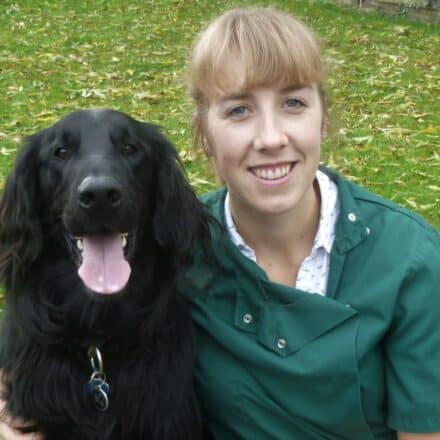You probably still have yard tasks even in the fall and winter months if you’re a keen gardener. Keeping it looking its best year-round allows you to enjoy it with your family when the weather is good.
But what if it’s not just your human family that you share your garden with? If you’re also a dog parent, you’ll want to be sure that your yard is safe for your pooch to run around in.
It can seem like the doggy dangers are endless when it comes to poisonous plants, weedkillers, and pesticides, not to mention gardening equipment. But what about Roundup? Is Roundup safe for dogs?
What Is Roundup?

Roundup is a commonly used weed and grass killer containing Glyphosate. When applied to plants, it is absorbed by the leaves, and acts by inhibiting specific enzymes. The plants need these functioning enzymes to absorb nutrients, so without them, they die. This makes it a very good weed killer, but it is also nondiscriminatory, so it can kill your favorite flowers too. So, you should use it with care if you don’t want a barren yard.
But are there other reasons you should use Roundup? Can it harm your dog?
Is Roundup Safe For Dogs?

Once dried, Glyphosate is considered less of a risk to your dog. However, if your dog ingests Glyphosate, it does have the potential to make them unwell. Glyphosate can cause severe immediate effects, like abnormal heart rates and rhythms, seizures, and labored breathing. Perhaps most importantly, it might be a human carcinogen, which may also cause cancer in dogs.
What Symptoms Can It Cause In Dogs?

Signs of Roundup poisoning that you might notice could include:
- Vomiting
- Diarrhea
- Labored breathing
- Skin irritation, especially around the mouth
- Hypersalivation (drooling)
- Wobbliness, excitement, or other unusual behavior
- Seizures
If your dog has not swallowed Roundup but has had contact with it, it can also cause skin rashes and eye irritation.
What Should I Do If I Suspect My Dog Has Come Into Contact With Roundup?

If You Have Seen Your Dog Ingest Roundup
If you know that your dog has ingested Roundup, contact your veterinarian immediately. If possible, get someone to put your pooch in the car or organize transportation while you make the call. It’s helpful if you have the Roundup label and package insert to give your veterinarian any helpful information they need.
If you are not sure how serious the issue is, call the ASPCA Animal Poison Control Center to discuss your dog’s symptoms.
If Your Dog Has Walked Through or Brushed Against Foliage Treated With Roundup
If you have seen your dog walkthrough or brush against treated foliage, they may have weedkillers on their fur, skin, or paws. You must act quickly to decontaminate them and prevent them from ingesting the chemical. It’s essential to stop them from licking their feet or grooming their fur and get them to a shower or hose as soon as possible.
It’s sensible to put gloves on your hands while you thoroughly rinse them off and check for any signs of skin ulceration or irritation.
If another family member or friend is available, they should contact the veterinarian for advice while you are decontaminating your mischievous pup.
If You Recently Treated the Garden and Your Dog Is Sick
If your dog accidentally gets into the yard soon after the area has been treated, they are at risk of weed killer poisoning. So, if your dog shows any of the above symptoms and you have recently used Roundup in the garden, you should take them to the veterinary clinic. Of course, it could be a coincidence, as there are many other causes of similar symptoms. But, if there’s a possibility that it could be Roundup poisoning, it’s not worth taking the risk of a delayed veterinary consultation.
Roundup In Public Areas
Roundup and other weed killers are not only used in private gardens. They can also be used in public spaces like parks, footpaths, and roadsides. So, if you see any evidence that an area has been recently sprayed, you should avoid it and take another route.
Remember that if your dog shows symptoms of weed killer poisoning, but you haven’t treated your garden, they may still have been exposed on walks. It is also possible that your yard can be contaminated by water runoff from other homes uphill from your own. Therefore, it’s important not to disregard any potential symptoms.
You can reduce the risk of your dog becoming irritated or poisoned from environmental treatments by wiping their paws after each walk.
What Can Your Veterinarian Do to Treat Weed Killer Poisoning?

Of course, weed killer poisoning is most treatable if you can get your dog to the veterinarian right away. If the ingestion happened recently, your veterinarian might be able to induce vomiting or give them activated charcoal to bind with the poison and aid rapid elimination. These measures can prevent Glyphosate from further absorption into your dog’s system.
Following this, your veterinarian may give your dog fluids via an IV drip to flush their system. Depending on the symptoms, the vet may also provide medications to settle the stomach or help the heart and lungs.
How Can You Make Your Yard Safe?

By hand weeding or using weed burners, pressure washers, or natural weed killers, you can avoid using any nasty chemicals.
However, if you do want to use weed-killing chemicals, there are a few guidelines you should follow:
- Always store chemicals like weed killers and pesticides securely out of reach of your four-legged friends and children.
- Choose a product that is pet safe. We recommend Green Gobbler.
- Before using any weedkillers, read the packaging and instructions thoroughly.
- Use the product according to the instructions.
- Keep your dog inside during treatment, with at least two closed doors between them and the area to be treated, if possible.
- Do not allow your dog to enter the treated area until the weedkiller has dried and you have waited the designated time detailed in the instructions.
- Contact your veterinarian if your dog comes into contact with the weedkiller or if they develop any signs of illness post-treatment.
- Discouraging your dog from eating grass can also minimize yard chemical poisoning.
Frequently Asked Questions

How long after using Roundup can dogs be in the yard?
To be absolutely certain it is thoroughly dry, wait half an hour after the section most recently treated looks visibly dry. You might be surprised to learn that this advice can also stop the weedkiller from spreading into fertile plants and ground via your playful pooch’s feet. After all, you don’t want paw-shaped bald spots on the lawn!
Can Roundup kill a dog?
If your dog ingests Roundup, it can lead to severe breathing difficulties, heart rhythm disruptions, and seizures. Sadly, these symptoms can be serious enough to cause death, so prompt treatment from a veterinarian is crucial.
How long until a dog shows symptoms of poisoning?
If your dog has ingested Roundup, they may not show every symptom, and signs might not be apparent right away. Some dogs might show symptoms like vomiting or excessive drooling almost immediately, while skin rashes, sores, or irritation can take an hour or two to develop. Other more severe symptoms, including labored breathing, seizures, or collapse, may not appear for a day or two, depending on the amount of Roundup ingested.
Final Thoughts
It’s understandable to want to keep your fur-baby safe when you’re using a potentially harmful chemical. As a pet parent, you’ll want to minimize risks. If Roundup is stored, prepared, and used according to instructions, the risk to your dog should be minimal.
But, you should keep your dog away from the treated area, at least until it is dry, to prevent them from ingesting the weedkiller. Cancer risk is stated to be minimal if your dog has no direct contact with Glyphosate, but we’d rather be safe than sorry and opt to find a safer weed-killing alternative. But, if you take the necessary precautions, you can likely keep your garden relatively safe and looking immaculate for you and your pup to enjoy.






Glyphosate is not a known carcinogen, while care should be taken, the EPA has debunked this. The iarc called it a “possible carcinogen” but offered little scientific.
As part of this action, “EPA found that there are no risks of concern to human health when glyphosate is used in accordance with its current label. EPA also found that glyphosate is unlikely to be a human carcinogen.”
Thank you for this info. We updated our content to include this link and info about the mixed feelings on the topic. Whether it is a carcinogen or not, the fact remains that it is still poisonous for a dog to ingest when freshly sprayed and can cause them to be unwell.
Thank you for this article! Our dog died about the same time “news” about Roundup being a carcinogen came out, so I did layman’s math and came up with 1+1=!
He would always eat the grass at the edge of the lawn -always the longest grass and of course the grass we sprayed with Roundup. Now we use a line edger to cut it lower than the lawn, spray it, and let it dry. He doesn’t give it a second look. You’ve really eased our worries!
Hi, I would like to know if there are any org
anizations or places that might help with veterinary treatment for dog care that may be due to illness from exposure to Roundup Herbicide? My friend has had a few dogs who have died with starvation like symptoms and one currently still alive with loss of appetite, sleepiness, weight loss, and he needs financial help to get the right vet care (I don’t think it’s properly being diagnosed!) And we need help NOW! If you know how we can get financial support…. PLEASE LET ME KNOW ASAP! I would appreciate it very much. Thank you.
Den it se